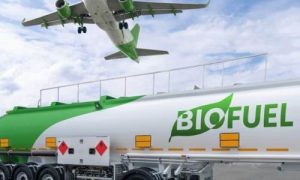BioVeritas announces launch of The BioVeritas Process™ for SAF

BioVeritas is launching The BioVeritas Process™ for sustainable aviation fuel (SAF), transforming biomass into volatile fatty acids (VFAs) through fermentation. This process enhances feedstock accessibility and reduces energy needs, yielding aviation fuel with lower carbon intensity. The process involves three steps: fermentation of diverse feedstocks to produce VFAs, low-energy acid recovery, and conversion of VFAs to SAF. CEO David Austgen emphasizes that this technology addresses current SAF production limitations and aims to help the aviation industry meet net-zero carbon goals.
BioVeritas, a prominent company in sustainable fuels and biochemicals, is set to launch The BioVeritas Process™ for producing sustainable aviation fuel (SAF). This innovative technology transforms biomass into volatile fatty acids (VFAs) through fermentation, which serve as a vital precursor for various high-value products, particularly SAF.
Originally known as Terrabon, the company has been exploring sustainable fuels for over 15 years. Since then, BioVeritas has made significant advancements in technology, especially in the distribution of fermentation products and acid recovery at its demonstration facility in Bryan, Texas.
According to BioVeritas, the application of The BioVeritas Process to SAF opens up access to more feedstocks while requiring less energy, resulting in aviation fuel with superior carbon intensity. This development helps to alleviate some of the major challenges currently faced by the SAF industry.
The BioVeritas Process for SAF involves three main steps: Directed Mixed-Culture Fermentation to generate VFAs, Low-Energy Acid Recovery, and the conversion of VFAs into SAF.
In the first step, Directed Mixed-Culture Fermentation utilizes a variety of abundant feedstocks, ranging from specially grown crops to agricultural residues and waste streams, to produce a blend of VFAs in a controlled manner. This control is achieved by directing the microbial physiology and ecology of the mixed culture.
The second step, Low-Energy Acid Recovery, employs BioVeritas’ proprietary extraction method along with efficient water recycling. Together, these features minimize the need for distillation and evaporation, which typically increase energy consumption in other production methods.
Finally, the VFA-SAF conversion process transforms the longer-chain VFAs into SAF through ketonisation, followed by hydrodeoxygenation and isomerisation—processes also utilized in the well-established HEFA/HVO method.
BioVeritas claims that its process addresses many of the fundamental limitations found in other SAF production technologies, such as restricted feedstock availability and green energy constraints.
David Austgen, CEO of BioVeritas, stated, “We are committed to supporting the aviation industry in achieving its net-zero carbon emission goals and helping the refining industry meet its renewable volume obligations. While there are many innovative technologies in development, SAF supply is expected to lag behind demand through the mid-century. Our goal is to collaborate with existing SAF producers to bridge this supply-demand gap.”
Austgen added, “Many current SAF technologies face significant limitations. BioVeritas’ process overcomes these challenges and is poised for unlimited future growth. Our low carbon intensity SAF solution represents a win-win-win for the aviation industry, the refining sector, and the planet.”
Source Link : https://bioenergytimes.com/bioveritas-announces-launch-of-the-bioveritas-process-for-saf/

















